DENVER — Three black women legislators hope to make discrimination against someone based on his or her hairstyle a part of Colorado’s anti-discrimination laws as they pertain to public education, employment practices, housing, public accommodations, and advertising.

Rep. Leslie Herod, D-Denver, Rep. Janet Buckner, D-Aurora, and Sen. Rhonda Fields, D-Aurora are the prime sponsors on House Bill 20-1048, “Race Trait Hairstyle Anti-discrimination Protect.”
It is scheduled to be heard in the House Business Affairs & Labor Committee at 1:30 p.m. on Feb. 5 in the Legislative Services Building, Room A.
The first draft would make it illegal to discriminate against students, teachers or other public-school employees on the basis of one’s race, including “traits historically associated with race, such as hair texture, hair type, and protective hairstyles.
It also includes an unrelated change, buried in section 9 of the bill language, impacting the state’s anti-bullying requirements for boards of education, replacing the pronouns “his or her” with “the student’s.”
Although the bill’s summary includes housing and advertising, the first draft does not mention the additional areas or how it would be implemented for them.

The bill defines “protective hairstyle” as including “braids, locks, and twists.” However, it does not address whether the same styles would be protected for people not typically protected by race discrimination laws, but who also choose to style their hair in the same fashion.
Some of the more well-known celebrities who have worn dreadlocks include Lady Gaga, Justin Bieber, members of the heavy metal band Korn and several American Idol contestants, to name a few.
The cornrow hairstyle has been popular among Caucasian women for years, including Bo Derek, Kim Kardashian, Melanie Griffith, Fergie, and Miley Cyrus, to name a few.
The bill specifically addresses charter schools and boards of education, outlining enrollment and job transfers.

It also addresses “public accommodations,” which include anything currently under the Americans with Disabilities Act of 1990 that provide goods or services to the public, such as restaurants, movie theaters, retail establishments, schools, childcare facilities, recreation, and doctors’ offices or other health care facilities.
The bill, however, does not address how the public accommodations section would be managed for industries where certain hairstyles may be banned for safety and cleanliness issues, such as food service or manufacturing, where braids and dreadlocks could get caught in machinery.
Herod, Buckner, and Fields had not returned requests for comment from Complete Colorado by press time. The story will be updated if needed.


